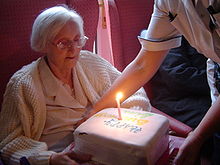Slow medicine
Appearance




Slow medicine fosters taking time in developing a relationship between the practitioner and the patient, and in applying medical knowledge, technology and treatments to the specific and unique character of the patient in his or her overall situation.
Quotes
[edit]- The loudest cry of patients is for compassion and attention, which is a call for time.
- Patch Adams, Vision of a Hospital Based on Fun & Friendship,Geshundheit! Institute
- Although I use many modalities in my practice, only 3 are basic: my hands, my voice, and my intention.
- John Diamond (2002). Facets of a Diamond: Reflections of a Healer, North Atlantic Books.
- As the patient tells, I listen as hard as I can--- not taking notes during this segment of the interview, not interrupting unless critical, not indicating one way or another what I consider salient or meaningful or interesting. I try my best to register the diction, the form, the images, the pace of speech. I pay attention--- as I sit there on the edge of my seat, absorbing what is being given--- to metaphors, idioms, accompanying gestures, as well as plot and characters represented for me by the patient. . . . I listen not only for the content of his narrative but also for its form. . . its silences, where he chooses to begin in telling of himself, how he sequences symptoms with other life events. After a few minutes, the patient stops talking and begins to weep. I ask him why he cries. He says, 'No one ever let me do this before.'
- What needs to be contested in medicine is seldom the accuracy of observations but the restriction of interest--- the frame drawn so tightly--- to the biological.
- Rita Charon (2008). Narrative Medicine: Honoring the Stories of Illness, Oxford University Press.
- The essence of Medicine is story-- finding the right story, understanding the true story, being unsatisfied with a story that does not make sense. Healthcare, on the other hand, deconstructs story into thousands of tiny pieces-- pages of boxes and check marks for which no one is responsible.
- We don't need to remake our health-care system or rebuild it from the ground up. We don't need to do very much. It's pretty simple, quite attainable. Just an added perspective and a change of pace.
- ...I learned a Slow Medicine lesson: how individual medicine was. It wasn't true that one size fits all, that everyone or no one should have that treatment or this pill. Rather, the right answer had to do with style, with who you were, who the patient was.
- [In likening Slow Medicine to Slow Food:] Slow Food was not really about fast or slow in time. Rather it was about privileging the basics-- the ingredients, which do take time: farmers' time and gardeners' time, and also their skill, experience, and knowledge. It was about accepting what is-- the seasons, weather, climate-- and flowing with it, not against it. It was about removing what is in the way of a plant being the healthiest, the most fertile, the happiest it could be, and doing so by little actions, by fussing and fiddling. That was how it was "slow."
- We can allow for Slow Medicine beds in our hospitals so that doctors have enough time to find out what is really wrong with a patient, and patients have enough time to heal.
- Victoria Sweet (2017). Slow Medicine: The Way to Healing, Riverhead Books.
- He {Bernard Lown, MD} called for a return to the fundamentals of doctoring-- listening to know the patient behind the symptoms; carefully touching the patient during the physical exam to communicate caring; using words that affirm the patient's vitality; and attending to the stresses and situations of his life circumstances.
- Joseph, Rich (24 February, 2018). "Doctors, revolt!". The New York Times. Retrieved on 28 February, 2018.
- But in one respect these two men are not typical of postmodern family doctors, indeed of postmodern medical practice generally. They are unhurried.
- Edward Shorter (1985). Bedside Manners: The Troubled History of Doctors and Patients, Simon and Schuster.

